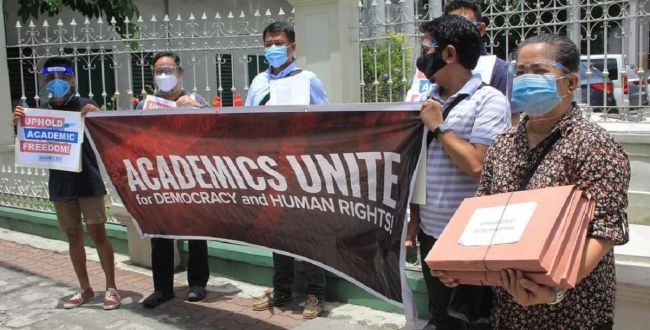Philippines : des universitaires engagent des poursuites judiciaires pour mettre fin aux menaces et au harcèlement
Le 1er septembre, une large coalition d'acteurs de l'éducation aux Philippines a déposé une requête contre la loi antiterroriste de 2020 (ATA) devant la Cour suprême nationale. Cette décision est une protestation contre la stigmatisation des enseignant·e·s en tant que ‘rouges’ par le gouvernement et a été prise par des syndicalistes enseignant·e·s, des professeur·e·s, des directeur·trice·s d'université et de collège, ainsi que des enseignant·e·s d'écoles privées.
Les universitaires ont demandé à la Cour suprême d'émettre une ordonnance d'interdiction temporaire et/ou un bref d'injonction préliminaire pour déclarer l'ATA inconstitutionnelle.
Terrorisme d’État
« Aujourd'hui marque le premier jour du dernier mois pour que le ministère de la Justice publie les règles de mise en œuvre et la réglementation de cette loi hautement contestée - qui renforce et intensifie le terrorisme d'État aux Philippines », a noté Raymond Basilio, Secrétaire général d'ACT et membre du Bureau exécutif de l'Internationale de l'Éducation.
Il a poursuivi en expliquant que l'ATA - avec ses dispositions imprécises et ses sanctions sévères - pose de graves menaces aux libertés académiques et au droit des universitaires d'exprimer et d'échanger librement des idées, des opinions et des analyses sur l'état social, économique et politique aux Philippines.
Droits enfreints
« Cela enfreint en outre les libertés et les droits fondamentaux, humains et du travail, comme nous l'avons vécu en 2019 avec le profilage des membres d'ACT dans tout le pays et la campagne de harcèlement et de calomnie, probablement menée par les forces de l'État », a souligné Basilio.
Il a également souligné comment Zara Alvarez, la coordinatrice d’ACT dans la ville de Bacolod, avait souffert des années de harcèlement, d'étiquetage en tant que terroriste, de menaces et d'incarcération illégale, avant d’être récemment assassinée brutalement.
Soutien aux collègues
L'Internationale de l'Éducation soutient ses collègues philippin·e·s et continuera de suivre de près la situation des éducateur·trice·s et des syndicalistes du secteur de l'éducation dans le pays.

[Tue, 01 Sep 2020 17:05:00 +0000] | DIGG THIS
Website Development and Design by Cyblance
